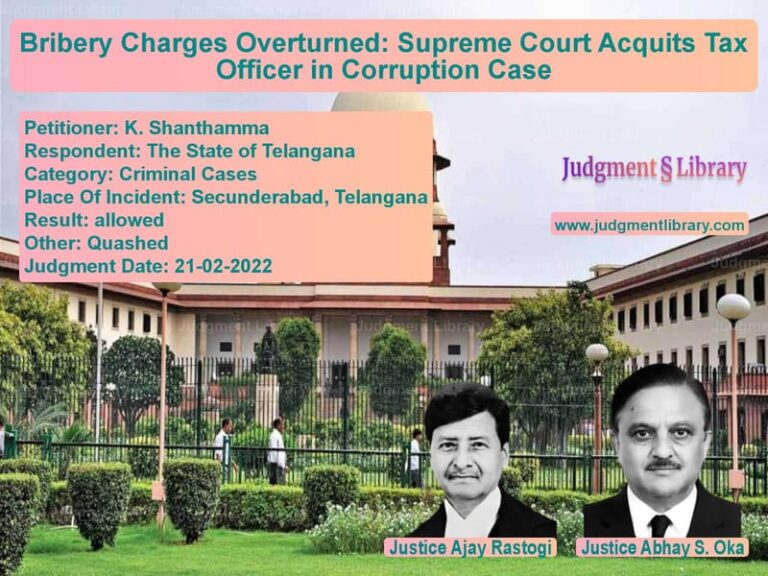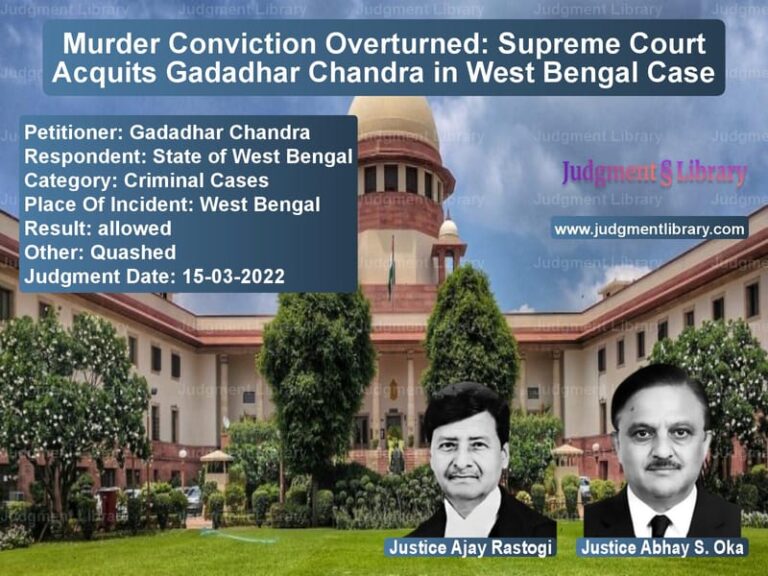Supreme Court Rules on Dishonoured Cheques and Insolvency: Section 138 NI Act vs. IBC
The case of Ajay Kumar Radheyshyam Goenka v. Tourism Finance Corporation of India Ltd. revolves around a fundamental legal question: Can criminal proceedings under Section 138 of the Negotiable Instruments Act (NI Act), 1881, be quashed due to insolvency proceedings under the Insolvency and Bankruptcy Code (IBC), 2016? The Supreme Court, in a landmark ruling, held that insolvency resolution does not absolve an individual from criminal liability under Section 138, reinforcing the penal nature of cheque dishonour cases.
Background of the Case
The dispute emerged from the financial transactions of M/s Rainbow Papers Limited, which had taken a loan from the Tourism Finance Corporation of India Ltd. (TFCI). The loan was backed by post-dated cheques issued by its Managing Director, Ajay Kumar Radheyshyam Goenka. Upon default, TFCI presented these cheques, which were dishonoured due to insufficient funds, leading to criminal complaints under the NI Act.
Key events leading to the dispute:
- March 2016: The cheques issued by the accused were dishonoured, prompting legal action under Section 138 of the NI Act.
- December 2017: Insolvency proceedings against M/s Rainbow Papers Limited commenced under the IBC, and a resolution professional was appointed.
- July 2019: The National Company Law Tribunal (NCLT) approved the resolution plan, extinguishing outstanding liabilities against the corporate debtor.
- August 2020: The accused moved the High Court seeking to quash the cheque dishonour proceedings, citing the IBC resolution.
- October 2021: The High Court dismissed the plea, holding that criminal liability under Section 138 of the NI Act remains unaffected by insolvency.
- March 15, 2023: The Supreme Court upheld the High Court’s ruling.
Issues Raised in the Case
The primary legal questions before the Supreme Court were:
1. Does IBC override the penal provisions of the NI Act?
The appellant contended that since the corporate debtor’s liability was extinguished through resolution, the criminal proceedings under Section 138 should be quashed.
2. Are post-dated cheques issued as security enforceable under Section 138?
The respondent argued that once a cheque is dishonoured, criminal liability is automatically triggered, regardless of its classification as a security instrument.
3. Can an individual be prosecuted for dishonoured cheques even if the company’s liability is resolved?
The Court had to determine whether an individual signatory could still be held accountable under the NI Act after corporate insolvency.
Arguments by the Petitioner (Ajay Kumar Radheyshyam Goenka)
The petitioner’s counsel, representing the Managing Director of M/s Rainbow Papers Limited, argued:
- The IBC resolution plan extinguished the debt of the corporate debtor, effectively nullifying the liability arising from dishonoured cheques.
- The proceedings under Section 138 of the NI Act are quasi-criminal and intended to enforce payment obligations. Since the debt no longer existed, prosecution should not continue.
- Several High Courts, in similar cases, had quashed cheque bounce proceedings where corporate debts were resolved through IBC.
- The resolution professional had taken over the affairs of the corporate debtor, rendering past financial obligations unenforceable.
Arguments by the Respondent (Tourism Finance Corporation of India Ltd.)
The respondent, TFCI, countered these claims, asserting that:
- Section 138 of the NI Act creates a distinct penal liability that is independent of the underlying debt.
- Extinguishment of corporate debt does not absolve an individual signatory’s liability under the NI Act.
- The cheque dishonour cases were initiated before the IBC resolution, and such proceedings cannot be automatically nullified.
- The company’s financial restructuring under IBC does not equate to an acquittal of its directors and signatories in cheque bounce cases.
Supreme Court’s Judgment
The Supreme Court ruled against the petitioner, holding that insolvency resolution under IBC does not impact an individual’s criminal liability for cheque dishonour.
1. Criminal Liability Under NI Act is Independent
The Court held that the criminal prosecution for dishonoured cheques is separate from debt recovery proceedings.
“Proceedings under Section 138 of the NI Act are penal in nature and cannot be nullified by an insolvency resolution under the IBC.”
2. Directors and Signatories Remain Liable
The Court clarified that even if a company undergoes insolvency, its directors and authorized signatories remain liable for dishonoured cheques.
“The liability under Section 138 is not confined to the corporate entity but extends to those responsible for its financial obligations.”
3. IBC and NI Act Serve Distinct Purposes
The judgment emphasized that IBC aims at financial restructuring, whereas the NI Act penalizes fraudulent financial practices.
“A financial resolution under IBC does not ipso facto result in the quashing of criminal proceedings initiated under Section 138 of the NI Act.”
4. Debt Settlement Under IBC Does Not Extinguish Criminal Proceedings
The Court rejected the argument that insolvency resolution should shield individuals from cheque dishonour prosecution.
“The approval of a resolution plan under IBC does not mean that criminal liability under the NI Act ceases to exist.”
Final Ruling
The Supreme Court:
- Dismissed the petitioner’s plea to quash criminal proceedings under Section 138 of the NI Act.
- Held that corporate insolvency does not shield individuals from cheque bounce cases.
- Directed the lower court to continue proceedings against the petitioner.
Implications of the Judgment
This ruling has far-reaching implications for corporate and financial law:
1. Strengthening the Integrity of Financial Transactions
- Ensures that corporate directors and financial officers cannot escape liability through insolvency proceedings.
- Protects creditors and financial institutions from fraudulent cheque issuance.
2. Reinforcing the Penal Nature of Section 138 NI Act
- The ruling clarifies that cheque dishonour is a criminal offense, not just a debt recovery issue.
- Discourages misuse of post-dated cheques as a financial instrument.
3. Limiting the Scope of IBC in Criminal Matters
- Prevents abuse of insolvency laws to evade financial obligations.
- Ensures that IBC remains focused on corporate restructuring without interfering with criminal liability.
Conclusion
The Supreme Court’s ruling in Ajay Kumar Radheyshyam Goenka v. Tourism Finance Corporation of India Ltd. establishes a crucial precedent in corporate finance. While insolvency laws help companies resolve debts, they do not provide immunity from criminal prosecution under Section 138 of the NI Act. The ruling safeguards financial credibility and upholds the principle that dishonoured cheques remain a serious offense regardless of corporate insolvency.
Petitioner Name: Ajay Kumar Radheyshyam Goenka.Respondent Name: Tourism Finance Corporation of India Ltd..Judgment By: Justice Sanjay Kishan Kaul, Justice Abhay S. Oka.Place Of Incident: New Delhi.Judgment Date: 15-03-2023.
Don’t miss out on the full details! Download the complete judgment in PDF format below and gain valuable insights instantly!
Download Judgment: ajay-kumar-radheyshy-vs-tourism-finance-corp-supreme-court-of-india-judgment-dated-15-03-2023.pdf
Directly Download Judgment: Directly download this Judgment
See all petitions in Cheque Dishonour Cases
See all petitions in Fraud and Forgery
See all petitions in Bail and Anticipatory Bail
See all petitions in Corporate Compliance
See all petitions in Judgment by Sanjay Kishan Kaul
See all petitions in Judgment by Abhay S. Oka
See all petitions in dismissed
See all petitions in supreme court of India judgments March 2023
See all petitions in 2023 judgments
See all posts in Criminal Cases Category
See all allowed petitions in Criminal Cases Category
See all Dismissed petitions in Criminal Cases Category
See all partially allowed petitions in Criminal Cases Category







